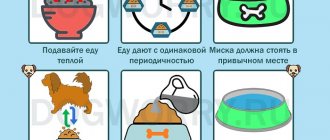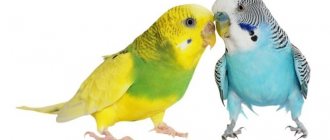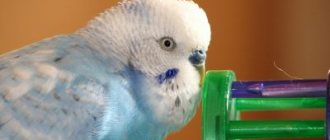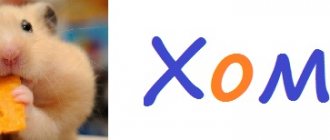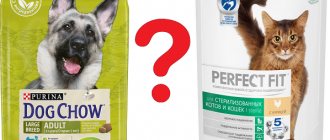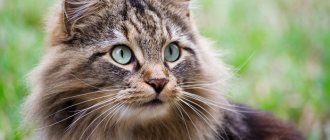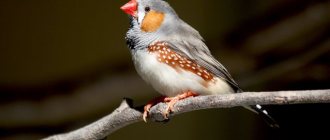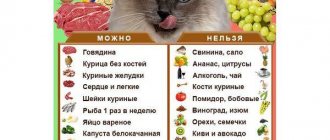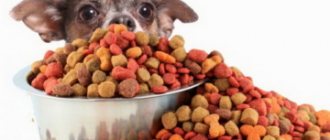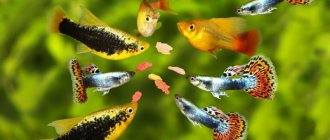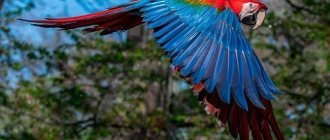Mixtures
If you don’t have time to prepare the food yourself and the ratios are unknown, you can purchase a ready-made mixture. It already contains everything necessary for the health of your pet.
However, it is necessary to check the integrity of the packaging and the quality of the product in it. If there is mold or an unpleasant odor, you should refuse the purchase. This is poison for the parrot, not food!
You can give your pet no more than a couple of teaspoons of food per day.
- Budgerigars are prone to overeating, so fasting days are arranged for them once a week.
- You should also not feed the birds a variety of delicacies: they begin to be picky.
Features of home feeding of a budgie
In addition to standard food at home, budgies need other sources of nutrients, microelements and vitamins necessary for healthy development and reproduction.
Watch the video of how a wavy eats from your hand
The issue of feeding is one of the most important for the owner. After all, the nutrition of parrots is the basis of their health and longevity, so you need to approach solving this problem with full responsibility.
This article will discuss in some detail the main components of the diet. If you teach your pet the right food from an early age, then in the future there will be no questions about what to feed the bird.
Vegetables
You cannot limit the diet of parrots to just mixtures. In addition to them, supplements from fresh vegetables are needed. Before feeding the bird such food, it is important to thoroughly wash the fruits.
Not all vegetables can be given to fluff balls. Valuable food is carrots. It is very useful for budgies. Raw, finely grated root vegetables are added to food . Carrots are mixed with breadcrumbs or a boiled egg.
- You can finely crush raw pumpkin seeds.
- Birds love melon and pumpkin pulp.
But parrots should feast on watermelon with caution.
Cleaning, of course, won’t be superfluous, but you shouldn’t get carried away with such food beyond measure. If the fluffy ball's lifestyle is sedentary, the bird has noticeably gained weight from nourishing food, then cucumbers are suitable for it. You can give your budgie more of them, but fresh, from the garden, and not store-bought.
Parrots need only fully ripe . Unripe fruits are unsafe due to the alkaloid in the composition. And there are no recommendations for beets. This root vegetable is rich in vitamins, microelements and fiber. And storing beets is easy. You can stock up on this kind of food for future use.
Corn is selected at milky ripeness, with tender and soft grains. It is important to choose beans with green peas for feed only with grains that are milky ripe and very soft.
It is very good to enrich the bird's diet with cabbage. Small leaves may not be cut. And the stalk should be cut as finely as possible.
Lettuce leaves and spinach are added to the food in small portions to avoid causing stomach upset. Bell peppers are cut into small pieces with seeds and fed to budgies.
There are vegetables and fruits that are contraindicated for pets. Experts do not recommend giving pet parrots radishes, celery, garlic, onions and aromatic herbs . They contain too many essential oils. And the taste of such food is too strong. Eggplants are also not given to budgies because of the alkaloid they contain.
What to feed budgies
The basis of the bird's diet is grains, but parrots also need succulent food: greens, vegetables and fruits. They are a source of natural vitamins necessary for development, health, and well-being.
Did you know? The head feathers of male
budgerigars can glow when exposed to ultraviolet light. This quality plays an important role when a female chooses a partner - the stronger the glow, the more attractive the parrot becomes.
Corn
The easiest way to purchase a grain mixture is at a pet store, but first you need to ask an experienced poultry farmer which ones are best for a given species.
The mixture includes:
- millet;
- oats;
- seeds (sunflower, flax, sesame, meadow cereals).
When purchasing, make sure that the packaging is sealed and check that the expiration date has not expired: the health of the bird depends on the quality of the feed.
Sprouted food
Sprouted grains have the greatest energy and biological value. They contain a large amount of vitamins, fiber and minerals. This food is especially valuable in winter, when there is a lack of fresh vegetables, fruits and herbs.
You can germinate grains:
- buckwheat;
- wheat;
- oats.
Important! There is no need to take a large amount - the bird will not eat it all at once, and you can store this food for a maximum of two days in the refrigerator.
The main thing is to choose live and not treated with chemicals. The grains are sprouted in a shallow container in a warm and dark place, wrapped in gauze and constantly moistened.
Porridge
Porridge is prepared exclusively with water, without seasonings or oil. You can cook it crumbly, or until half cooked - it depends on the product and the preferences of the bird.
Check out the most popular types of budgie colors.
For this use:
- buckwheat;
- millet;
- crushed wheat;
- peas;
- rice.
To ensure your pet receives the maximum amount of nutrients, prepare several types, mixing them before serving. If food is prepared for future use, the remainder can be frozen. Remember: you need to defrost it naturally, not in the microwave. You can also add chopped herbs, fruits or berries to the porridge.
Greens and twigs
Greens are collected in ecologically clean areas. The grass is torn carefully, in small bunches, so as not to capture a poisonous plant. Before serving, you need to carefully sort it out, remove insects, and wash it.
Read more about how to breed budgies at home, and also find out what determines and how to extend the life of budgies at home.
You can give the following herbs:
- meadow - clover, burdock (burdock), plantain, nettle;
- green cereals - oats, barley, wheat;
- garden greens - spinach, lettuce, carrot and beet tops.
The parrot needs twigs to grind down its beak. You can give branches of all fruit trees and shrubs with buds, provided that they do not contain resin.
You can also give branches of some deciduous trees:
- birch;
- aspen;
- linden;
- maple;
- chestnut;
- alders;
- ash;
- beech
The branches are kept in water for several hours to remove insects, and then scalded with boiling water.
Important! It is undesirable to give willow (willow) twigs, especially in the fall
- by this time it accumulates substances toxic to birds in large quantities.
Fruits and berries
Fruits and berries are given in small quantities, in a separate container - cleanly washed and without peeling. The peel of many fruits, especially imported ones, can be treated with various substances, for example, to repel insects and rodents. This is poison for a parrot.
You can feed your bird the following fruits and berries:
- apricot, plum, peach;
- a pineapple;
- banana;
- melons;
- grape;
- cherry, sweet cherry;
- pomegranate;
- kiwi;
- citrus;
- apple and pear;
- berries - all garden and forest.
You will probably be interested in learning about the singing characteristics of budgerigars.
All of the above can be given both fresh and dried.
Vegetables
Vegetables and root vegetables, like fruits, contain many vitamins and minerals. They should be present in the bird's diet in small quantities.
Can be fed:
- vegetables - zucchini, cucumber, squash, tomato, corn, bell pepper, cabbage;
- root vegetables - carrots, turnips, beets;
- legumes - young peas, milky beans.
Only ripe tomatoes are given, because green ones contain too much solanine, which is toxic to the parrot. It is advisable to give milk corn, that is, not quite ripe, not hard. Vegetables do not need to be peeled from seeds; they will bring their own benefits. The cabbage stalk and root vegetables need to be grated on a coarse grater or chopped into small pieces.
In addition to budgerigars, some of the best breeds of talking parrots also include: macaws, cockatoos, lorises, rosellas, lovebirds, eclectus, gray grays, amazon and cockatiels.
Mineral supplements and vitamin supplements
Parrots have a weak muscular part of the stomach - this means that birds need to swallow sand and tiny stones, scientifically called gastroliths, to grind and digest food. You can’t just collect sand in a sandbox or at a construction site; special mixtures are sold in pet stores.
The container with them is placed next to the feeder. In addition to gastroliths, birds need mineral supplements containing substances necessary for the normal functioning of the central nervous system, digestive tract, cardiovascular, circulatory and reproductive systems:
- calcium;
- sulfur;
- phosphorus;
- magnesium;
- iron.
Their sources are the following products:
- chalk;
- sepia;
- crushed eggshells;
- bone flour;
- calcium gluconate and glycerophosphate;
- charcoal.
Fruits
Cute pet birds like fresh fruit in their food. Be sure to rinse them under running water.
- Select fruits that are well-ripened and without signs of spoilage.
- Apples should be in the diet all year round. There is no need to be afraid of an overdose: it is difficult to do.
But before feeding the wavy pet an apple, the fruit is peeled. But too generous portions of pears will not bring any benefit.
Oranges and tangerines are a healthy and tasty treat for parrots. It is good to feed the birds grapes, provided they receive 5-7 berries per day. For a small bird, one grape with food seems like a whole watermelon.
Pets will also like banana. But it’s just important to remove the skin from the fruit. Peaches and apricots are very tasty and healthy. Birds love cherries, cherries, rose hips, and currants. Budgerigars eat raspberries, blueberries and honeysuckle, dried and fresh.
Before adding kiwi to food, remove the skin from the fruit. Pineapples are given little by little and only fresh. Canned fruits are not suitable for birds.
Avocados, persimmons and mangoes are strictly contraindicated for parrots. These “delicacies” can poison birds. You should not give too many nuts because of their fat content. The norm per month is 2 pieces of walnut.
Feed
Subspecies
Food for budgies is divided into two types: animal and plant. The first type consists of eggs, fish oil, cottage cheese and other products. Feeding budgerigars with food of animal origin should be done no more than three times a month; this type of food is considered supplementary.
You will learn what you can give birds from animal food and what you cannot feed budgies in the article “Can a budgie eat bread, eggs and other foods.”
Basis of avian nutrition
The second type of food for a wavy pet consists of many plant seeds, grains, fruits, vegetables, herbs, and berries. The best food for budgies is a grain mixture. It is considered the basis of any bird diet and may contain the following ingredients:
- various varieties of millet;
- oats;
- millet;
- canary seed;
- flax seeds;
- nougat seeds;
- rapeseeds;
- sesame seeds;
- safflower seeds;
- hemp seed;
- raw sunflower seeds;
- wildflower seeds.
What you can feed your budgie is up to you - there is a huge variety of grain mixtures on the bird food market. For example, food Padovan, Prestige, Kiki, Rio and others.
To choose your bird's favorite type of food, you must first give him one brand to try. When it runs out, another one until you find one that your pet will not only eat with special pleasure, but also loudly ask for more. Also, “wavy animals” can be interested in monofeed - different grains in separate packages. For example, just oats or canary seed separately.
Now we will talk about how to feed a budgie so that it is not hungry, but also does not become obese, as well as about the quality of the grain mixture.
Daily norm of grain mixture
A wavy pet should eat no more than two to three teaspoons of food or about twenty grams per day. Young birds can eat a little more than adults, since their bodies need energy and full development, which it takes from food.
Make sure that your pet does not overeat - give him a maximum of three teaspoons per day. Don't spoil your parrot. If you notice that the food has begun to run out in the first half of the day, no longer give the bird the entire daily allowance in the morning, but stretch it out throughout the day.
A budgerigar should have regular meals. These birds simply cannot starve, because they have a very fast metabolism. Their body quickly digests and assimilates food, so they cannot do without it for more than a day. Be careful: pets usually eat the grains and leave the husks behind - do not mistake them for edible food. Replenish your parrot's food supply every day.
Selection conditions
It is preferable to choose a grain mixture or monofeed in sealed packaging: in a bag or vacuum packaging. A simple cardboard box or loose feed does not guarantee compliance with the necessary storage conditions. In this form, food can be spoiled.
When buying food directly from the store, be sure to check the integrity of the packaging - squeeze it with your hands. If no air comes out, then everything is fine. If you have the opportunity to see the quality of the food through the transparent parts of the packaging, take advantage of it. Don't forget to check the expiration date, which is printed right on the packaging.
Before giving your budgerigars the purchased food, pour it into a plate and examine it carefully. It should be free of mold, dark spots and traces of someone’s life activity: droppings, insects or larvae. The quality of the grain mixture is indicated by its natural color and shine. You can even taste the grains - the edible food is pleasant, slightly sweet.
Sprouted food
Sprouted grains are not only an excellent alternative to dry food, but also a very nutritious and healthy food. Sprouted food increases its biological value: content of vitamins and fiber. Thanks to this, the birds’ immunity is increased, their metabolism is stabilized, and possible disruptions in the body are restored.
Sprouted grains are especially useful in the cold season, during molting, when feeding offspring, when birds lack vital substances. You can germinate millet, millet, barley and other grain crops.
Carefully selected grains must first be washed well in running water and then filled with warm water. Preferably overnight. After this, the water is drained, the grains are washed again, poured into a suitable saucer and covered with gauze (bandage) folded in several layers. The main condition is that the fabric needs to be wet and lightly squeezed so that it becomes damp. The saucer is placed in a dark place, where it is warm.
To prevent the grains from drying out, they must be washed every three to four hours, and the gauze must be moistened. But they should not be completely in liquid. Food is given to the pet as soon as white sprouts appear - after about twenty-four hours. Before serving, they need to be rinsed again and dried well. You can store sprouted grains in the refrigerator, but no more than two days.
Now let's look at what budgies eat besides food.
Other plant food
For those who are concerned about what to feed their budgies besides food, we hasten to rejoice - these pets can also be given various fruits, vegetables, herbs, and berries. This food is an excellent vitamin supplement that can keep the bird’s body toned and healthy. Read the article “What fruits and vegetables can you give a parrot” for details.
Treats for birds
In addition to the main food, you can also buy treats for budgies. In pet stores, you may be offered to buy your pet wooden sticks with grains glued to them.
Experts have different opinions about the usefulness of these delicacies. Some believe that birds can be poisoned by such a delicacy, since it is not known what exactly the sticky part on the stick consists of. Others claim that thanks to these sticks the bird will be in good physical shape. After all, in order to eat, she will have to try hard.
Whether you can give them to budgies is up to you to decide. If you are in doubt, then you can buy millet or chumiza on a branch as a treat.
Greenery and branches
You can enrich your budgerigar's diet with greens every day. Outside the city, you can collect weed yourself, away from the roads. Suitable fodder is clover, scalded young nettle , grape leaves, carrot and beet tops, plantain, young tree shoots, green buds and leaves.
Parrots love to chew on things. So that they do not have to settle for wallpaper or baseboards, it is important to offer them finely chopped twigs. But before giving them to your pet, the branches are placed in cold water for 5 hours, then scalded with boiling water to rid the homemade food of dangerous insects.
Budgerigars will like pear, currant, and cherry branches. It is important to ensure that no pieces of tree resin remain. Branches of linden, rowan, chestnut, viburnum and hawthorn are suitable for parrots.
But you cannot give poplar, lilac, oak , acacia or conifer branches as food. And among house plants there are dangerous ones for budgies. So you will have to put Dieffenbachia, chlorophytum, and azalea out of reach. In addition to them, fern, arum, heather, foxglove and tobacco are dangerous.
There will be no harm if the bird tastes Tradescantia, Crassula or roses. It’s not scary if a little aloe or chrysanthemum with bamboo bites.
What can you give besides basic foods?
In addition to the main food, your feathered pets can and should be pampered with all sorts of tasty and healthy additives. Budgerigars are big gourmands who happily feed directly from their owner's plate. However, you should not allow them to do this, because the bird can develop gastrointestinal upset, which is dangerous for it, even to the point of death.
Did you know? Both in nature and in captivity, budgies are truly distinguished by their “swan-like fidelity.” Having lost a partner, they may even die from stress.
It is better to worry about special treats for your pet that are absolutely easy to prepare, accessible and inexpensive. Among the goodies, in addition to the main food, you can offer the bird branches of fruit trees, all kinds of vitamins and minerals, as well as homemade treats.
Video: what to feed a budgie
Fruit tree branches
During the cold season, when it is difficult to find high-quality fresh herbs and fruits, and useful substances are needed more than ever, you can supplement the diet of birds with the bark of fruit tree branches. Moreover, in nature, budgies often gnaw the bark from the branches on which they sit.
Did you know? Like people, there are right-handed and left-handed budgerigars.
The bark of the following trees and shrubs is most useful for parrots:
- Rowan;
- apricot;
- viburnum;
- plum;
- currant;
- Apple tree;
- hawthorn;
- raspberries.
In addition, birds can be offered twigs of linden, alder, willow or aspen. In order to neutralize the branches from pathogens and parasites, they should be pre-treated.
This is done as follows:
- Freshly cut branches are placed in water and kept for 10–12 hours.
- The material kept in water is doused with boiling water or processed in a preheated oven for 5–10 minutes.
Properly disinfected branches can be placed at a height of 5–7 cm from the pallet or made into perches. This imitates the bird’s natural habitat - the bird will sit “on a tree” and gnaw the bark. There are tree species that absolutely cannot be used both for perches in parrot cages and for feeding.
We advise you to find out whether your parrot can have fried seeds.
Among them:
- Oak, bird cherry and pear. These breeds contain a large amount of tannins, an excess of which can be detrimental to poultry.
- Poplar. This tree is called the lungs of the city, as it has the ability to absorb all harmful toxins.
- Coniferous trees. They contain a high concentration of resins, an excess of which can be fatal for the bird.
- Lilac. Contains strychnine, tannins and glycosides, which are very dangerous for poultry.
Mineral mixtures
In winter, when birds lack bright sun and natural vitamins, you need to support your pet with all kinds of supplements. It is most convenient to purchase them ready-made at a pet store. But some parrot breeders prefer to use mineral supplements in their pure form.
The most common of them are:
- Birch charcoal. The substance has excellent absorption capacity and removes waste and toxins from the body.
- Crushed eggshells. Replenishes poultry's need for phosphorus and calcium.
- Unsalted chalk. Necessary for the correct structure of the bird's skeleton.
- Bone flour. Source of proteins.
- Sepia. A substance consisting of crushed cuttlefish shell. Responsible for metabolic processes in the parrot's body.
- Calcium gluconate in tablets or solution. Used for acute calcium deficiency in poultry.
Vitamin supplements
Vitamin complexes are no less important than minerals for parrots. The need for supplements is especially high in birds during the period of waiting for offspring, feeding chicks, illness, and seasonal molting.
Important! Budgerigars cannot live long without food, so the bird should be fed daily. Even when it seems that the feeder is full, there may be only husks without kernels.
As with mineral supplements, vitamin complexes can be purchased in ready-made form. They differ in their composition and solve different problems. To choose the right vitamins for your pet, it is better to consult with a specialist who will prescribe a complex suitable for your bird.
Vitamin supplements are as follows:
- to improve immunity;
- aimed at maintaining the bird during molting;
- to strengthen the digestive system;
- ensuring the recovery of the body after infectious diseases;
- to normalize metabolic processes;
- increasing protection against pathogens and parasites.
Treats
Like any pet, budgies love treats. The leading place among delicacies is occupied by honey sticks, which are easy to make at home.
For this you will need:
- coarse wheat flour: 1 tbsp. l.;
- purified drinking water: 1 tbsp.;
- natural honey: 0.5 tsp;
- grain mixture preferred by the pet.
The basis is a branch of a fruit tree or bush, to which a special clamp or wire loop is attached.
You will be interested to know whether it is possible to feed parrots millet.
Preparing this delicacy is simple:
- Dilute honey in water.
- Add egg and flour.
- Coat the twig with the honey mixture and dip into the grain mixture.
- When the mixture dries, apply a second layer of honey glue, then sprinkle with grains again. Make several layers this way.
- Secure the last layer with the sweet mixture and dry at room temperature for 24 hours.
Parrots love such sticks very much and are ready to eat them all year round. In addition, as a treat, you can offer the bird sprouted seeds of your favorite cereals, as well as protein foods - fish oil, chopped chicken yolk. Among other things, feathered pets are very fond of all kinds of berries, fresh and dried. So, it is better to always have rowan, viburnum, sea buckthorn, currants, and rose hips in the house.
Mineral supplements
It is useful to enrich your budgie's food with mineral supplements.
Small pebbles and sand will help digest food. But it is advisable to give special sand, and not add street sand, in order to exclude the presence of parasites and harmful bacteria in it. Grinded chalk is added to parrots' food . You can attach small pebbles of special chalk to the bars of the cage. Construction is not suitable.
Boil the shell very well, dry it and grind it into powder. The result is an excellent mineral homemade fertilizer. It’s a good idea to add charcoal or bone meal to the shells and sand to remove poisons from the bird’s body.
Water
There are also requirements for water. The budgerigar's fluid should always be fresh. It is optimal to give the bird small portions of water, constantly replacing it. The temperature of the liquid will have to be measured. The ideal indicator is 15 degrees .
It is recommended to wash the drinking bowl daily. Birds should not be given tap water, but bottled liquid for children or filtered water. You can offer your parrots a mixture of 100 ml of water and a couple of drops of lemon juice and apple cider vinegar to prevent megabacteriosis.
Useful for cleaning the stomach of a parrot and honey. A few drops and the bird’s stomach is cleansed. Enrich the food with protein feed and sprouted grains. Both fish oil and low-fat fresh crumbly cottage cheese are recommended.
Porridge
Feeding birds boiled porridge every day can only benefit them. But although buckwheat, soybeans, corn grits, barley, millet and rice are acceptable as food, porridge is cooked only in water, without sugar, oil, salt and other seasonings.
For newborn budgerigars, liquid porridges, wheat and semolina , provided that a minimum amount of sugar, a little crushed shell and a drop of fish oil are added to a teaspoon of food.
Babies will have to be fed from a syringe. For one bird – 3-5 ml per feeding. Liquid porridge contains a sufficient amount of water.
Recommendations for feeding birds
Salt is contraindicated for wavy birds. Even small portions of it are destructive. And eating bread alone is not for budgies. It is permissible to eat only white crackers, crushed and added to finely grated vegetables. And milk will harm the budgerigar's delicate stomach. But fruit and vegetable juices with food are beneficial .
- Chocolate is poison for birds.
- You can't give them anything fried or smoked.
- Sudden changes in diet - and the bird gets sick.
- Budgerigars are conservative when it comes to food, and it is important to gradually diversify their food.
- Autumn and spring are molting times. During these periods, vitamin complexes are needed. The proportion of fruits in the diet can be increased.
- The birds are fed several times a day. Appetite increases at cool temperatures and long days. The more active a bird is, the more it needs food.
If you competently approach the preparation of a diet for a budgerigar, then he will be cheerful, cheerful and grateful for caring for him for a long time.
